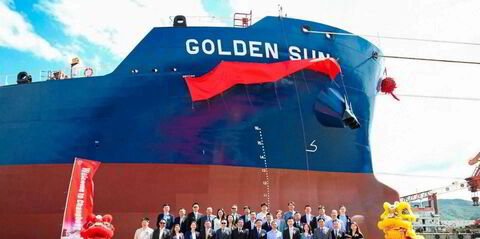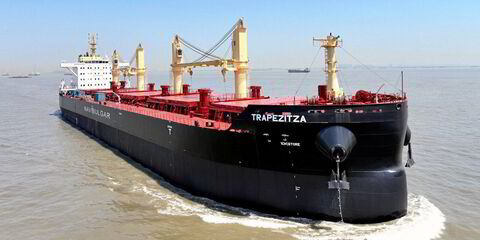The COP27 climate conference in Egypt has seen John Kerry, the US president’s climate envoy, trumpet the expansion of the First Movers Coalition.
The public-private partnership aimed at teeing up demand for clean technology through advance purchase commitments.
With 65 new members, the coalition now has $12bn in corporate pledges that the US State Department trumpeted as the “world’s strongest demand signal” for the likes of clean steal, zero carbon fuels and CO2 removal.

And shipping is front-and-centre in the effort. The expanded list includes major shipping names AP Moller-Maersk, Mitsui OSK Lines and Hoegh Autoliners. And miners Rio Tinto, Fortescue Metals Group and BHP, trading giant Trafigura, tech giant Amazon, and investor Aker have all signed up for shipping-related pledges.
And while the effort has led to some controversy over the inclusion of offsets in its corporate pledges, the effort highlights the value of “first movers” at a time when so much uncertainty surrounds green fuels.
AP Moller-Maersk, for example, no doubt made it easier for others to invest in methanol fuelling, which has the potential to be a zero-carbon option once more green volumes become available, when it took the leap with its newbuilding orders.
But recent data from Clarksons Research shows how much road there is to travel in moving from first movers to industry-wide adoption, yet it also shows the immense opportunity to make the global shipping fleet incrementally greener using existing technology.
The Green Technology Tracker shows that energy-saving technologies have been fitted on 24.8% of the total shipping fleet. Those technologies wind assistance like Flettner rotors and wind kites, as well as propeller ducts, rudder bulbs and air lubrication.
Five years ago, only 18% of ships had at least one energy-saving technology, so the growth of their use is significant.
75% to go
But the figure means that more than three-quarters of the global shipping fleet is not utilising any of these technologies.
Our Green Seas newsletter and podcast recently reported how Carnival Corp, the world’s largest cruise company, went from being a first mover on air lubrication to a major adopter, with plans to have a fleet of 17 vessels with the systems.

The systems, which use a layer of microbubbles to reduce water resistance, have brought Carnival 5% to 6% fuel savings. But across the global shipping fleet just 244 have been ordered, and many of those reflect older systems that are no longer in use, according to data from Silverstream Technologies. The UK company, the provider for Carnival’s air lubrication systems, has 110 orders to its name.
The energy-saving technology data does not include eco ships, those with electronic injection engines that also boost fuel economy. Here the growth is even stronger, from 14% of the world fleet five years ago to 29% today, according to the Clarksons report.
More eco?
And yet, that also means more than two-thirds of the shipping fleet is without this tech that, like energy-saving devices, can reduce emissions by reducing fuel consumption.
Chartering markets, however, are providing incentives for the eco ship fleet to grow. At the time that I write this, estimates from shipbroker Howe Robinson’s latest estimate showed an eco VLCC could earn 11% more in time-charter equivalent earnings than a similar tanker with a conventional engine.

The challenge for shipping’s decarbonisation path is finding even greater incentives for more uptake of existing green technology.
Bryan Comer, marine programme lead at the International Council on Clean Transportation, recently told our TW+ magazine that strengthening of the Existing Efficiency Design Index could lead to more retrofits for drag-reducing technologies like air lubrication.
And certainly making greenhouse gas-emitting fuels more expensive through a carbon tax could make energy efficiency more appealing.
But while fuel-saving technology is a way to reduce carbon emissions now with available equipment, it also helps pave the way for use of alternative fuels. That’s because the efficiency gains also mean ships can use less of these more expensive fuels to get where they need to go.
So let’s applaud the first movers on zero-carbon shipping, as well as the second movers making investments today in existing green technology.
This article has been amended since publication to reflect that Silverstream has won 110 orders for air lubrication systems, meaning the global total is 244.




